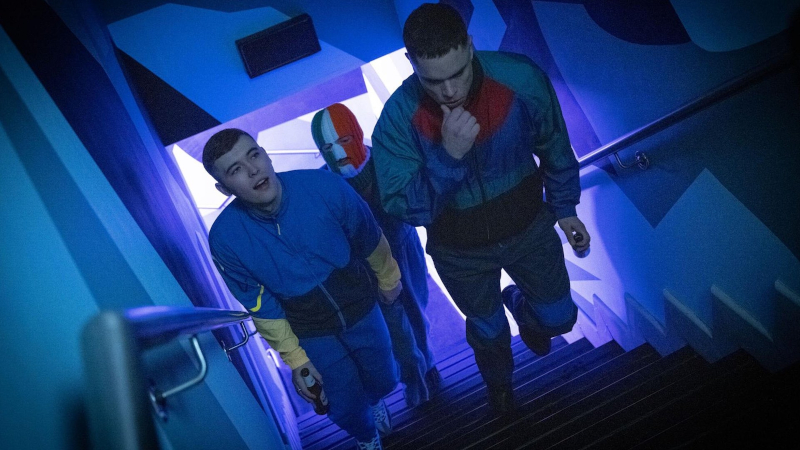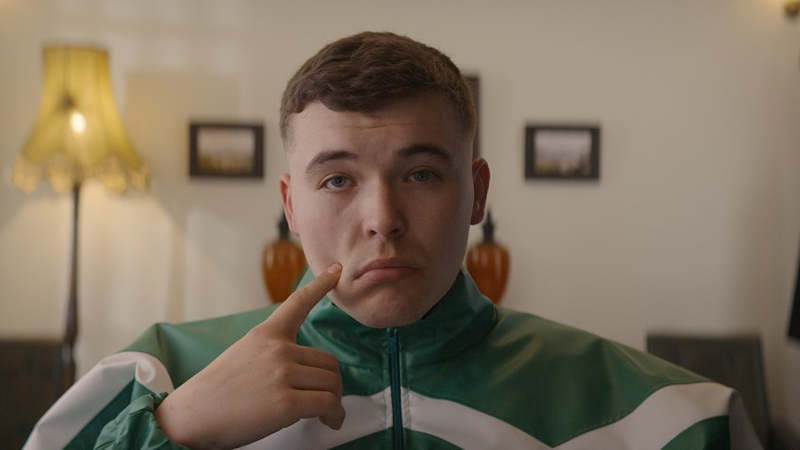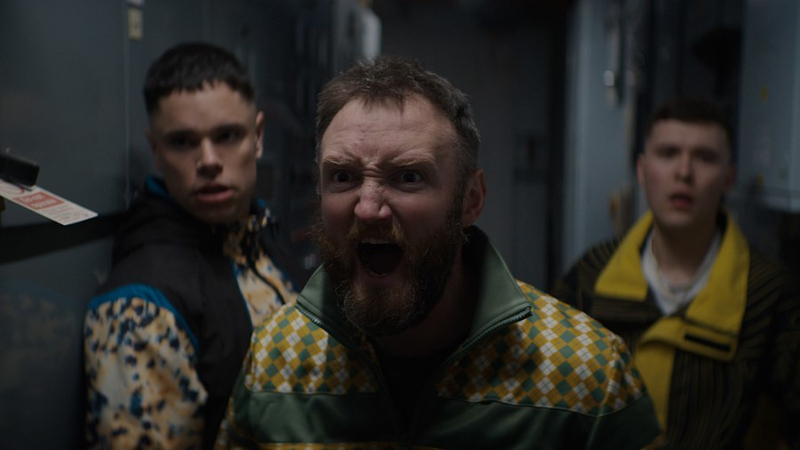Director – Rich Peppiat – 2023 – Ireland, UK – Cert. 18 – 105m
****
A fictionalised origin story about an Irish language rap band as a music teacher teams up with two younger men to turn their confrontational, anti-British poetry into Irish rap music – provocative sex-, drugs-, and violence-laced music biopic is out in UK cinemas on Friday, August 23rd
NSFW
Kneecap are an Irish-speaking rap band who came together on the eve of the 2017 Irish language march in Belfast, Northern Ireland. This drama about them, whatever else it might be and whatever other accusations can be levelled against it, certainly never plays it safe.
That’s obvious from the get-go, when the voice-over by one of the band members explains and shows how all movies abut Northern Ireland start – with footage of terrorist explosions during ‘the troubles’. The film then proceeds to have its cake and eat it, having started in exactly that manner, by starting again with the story of one of its members as a child being baptised in a wood at night and attracting RUC helicopter searchlights for their pains.
It moves pretty swiftly on to show the two fully grown lads in the band as party animals, consuming alcohol and drugs and dealing the latter, for instance giving it away free at early gigs to attract an audience, and engendering a hostile attitude to the Peelers (as they refer to the British police).

How true any of this might be is impossible to say (and the film isn’t attempting a detailed, factual, historically 100% accurate depiction); to some extent, it resembles an acerbic remodelling of the Beatles film A Hard Day’s Night (Richard Lester, 1964) which accurately captures the relationship between the individual members of the band, and part of what lay behind their appeal and made them great, while pedalling an obviously untrue (if compelling) yarn about Paul McCartney’s grandfather.
I only saw that film decades after it came out, by which time I knew a great deal about the Beatles, including whom each of them were, but from what I remember of the film, their identities were pretty obvious.
By way of contrast, I’m seeing Kneecap on its initial UK release and coming to it with zero knowledge of the band, who are currently (as the Beatles were then) in their ascendency. Their rap songs, many of them wholly or partially in the Irish language – as indeed is much of the film’s dialogue – possess an undeniable energy and urgency, and it’s quite clear that there are three of them, one of who is much older and gives up a career as a music teacher in order to be part of the band.
This much is pretty true to life, and while you could certainly take the film to task for failing to tell you the names of the three band members so that you remember who’s who, they come across as three distinct characters.
One of them is Naoise while another, the music teacher who joins forces to become the band’s third member masking his face onstage with a woollen hood in the Irish green, orange and white tricolour, operates under the provocative onstage alias of DJ Próvaí.
For the record, the two younger ones operate under the stage names Mo Chara and Móglaí Bap, but it’s hard work working out which is which as they’re often on the screen as a duo. Of course, for those already familiar with the band and its members’ names, this won’t matter a jot (and, to be honest, for anyone else it won’t matter much either).

After all this, we may well be into fictional territory (honestly, I have no idea how true to life the rest of the film is, and it offers little in the way of clues in that regard) with Naoise being the son of hard line IRA terrorist Arlo (Michael Fassbender) and a wise if put-upon mum (Simone Kirby from Calm With Horses, Nick Rowland, 2019; Notes on Blindness, Peter Middleton, James Spinney, 2017, Peaky Blinders, TV series, 2014), both of whom speak Irish in the home.
Arlo teaches both Naoise and his best mate that “every word of Irish spoken is a bullet in the name of freedom” which sounds at once like an argument in favour of indigenous language everywhere and an advocacy of (gun) violence. It’s certainly not an approach any advocate of non-violent resistance would condone.
By the time we see them as adults (i.e. the next scene), the two boys have taken the message, at least in its first iteration, to heart. Both have also embraced a partying ethic involving much intake of drugs and, in the case of one of them, as much sex with as many partners as his body can handle – although, after the introduction, he seems to have only one, a Protestant girl named Georgia (Jessica Reynolds from TV series Outlander, 2022-3; Derry Girls, 2022) with whom he indulges in verbal, pro-Republican sentiments during coitus on which she seems to get off like a masochist whose socio-political roots are being abused. (It’s therefore something of a shock when, after witnessing one of their gigs at which DJ Próvaí exposes his bum cheeks to reveal the words ‘Brits’ and ‘Out’, she takes exception to the anti-British sentiment rather than finding it a turn on.)

At times, all this feels like a regular drama set in West Belfast thanks to such staple characters as the terrorist dad and long-suffering mum, the music teacher – crushed by the staid nature of the school in which he works – and his pro-Irish language girlfriend, the harsh and uptight lady Detective Ellis of the RUC (Josie Walker from In Camera, Naqqash Khalid, 2023; The Wonder, Sebastián Leilo, 2022; Belfast, Kenneth Branagh, 2021), with whom the ante is upped about two thirds of the way through with the revelation that she is Georgia’s aunt who lives in the same house. There are even paramilitary factions beating people up and involved in shootings.
However, at others, it feels like something else altogether. The sex scenes, at once joyous and loaded with a Northern Irish, linguistic, sectarian undercurrent, are both striking and unique. Much alcohol and drugs are seen to be consumed, yet curiously there’s only one surreal sequence of the hallucinogenic experience – a ketamine-infused vision of bus transport, all sedate old people wearing coats laced with DayGlo colours towards the beginning. Detective Ellis, while feeling very Northern Irish, could almost be an authoritarian from any repressive regime anywhere, particularly when she starts using a taser and a riding crop like implement on members of the band.
The whole remains hugely impressive, and very funny in places, and yet I had doubts about it too: it seems to both be unquestionably gung-ho for hedonism, including drugs dealing, use, and abuse, and equally unquestionably supportive of the idea of armed resistance to overcome oppressors. Not that the band themselves take up an arms struggle – the tools of their trade are essentially words, backing music and gigs – but those ideas are carried in their words (and the hedonism carried in their lifestyle).
Still, you certainly can’t deny the energy that propels the narrative, and questionable ideas aside, the music has an irresistible immediacy while the piece overall remains one hell of a ride. And, as a fictional band origin story, it’s not bad at all. Extremely likeable, in fact.
Kneecap is out in cinemas in the UK on Friday, August 23rd.
Trailer:
